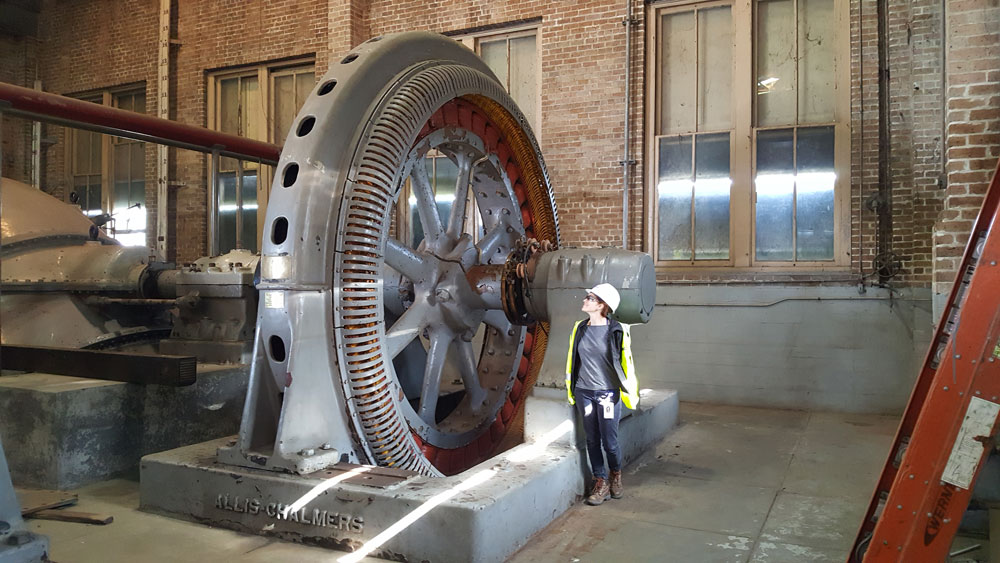
Andrea DuMont ’14 is a former student of Texas A&M University who received her master’s degree in water resources engineering. DuMont now works as a consulting water resources engineer and, in addition to her day job, runs a personal blog called The Watermark where she writes about all things engineering. We sat down with DuMont to find out what it’s like to be a water resource engineer by day and work as an engineering social influencer by night.
1. What do you do on a day to day basis as a part of your job?
“I work as a consulting engineer which means I solve all sorts of water problems for different communities, companies and people. I consider myself a water engineer because my projects involve groundwater, hydraulics, pumping systems and dams. I might start the day using ArcGIS or writing my ideas into a report, but by the end of the day I've stepped into meetings or driven out to see a construction site or a client. It's extremely mobile and flexible because of the project-based nature of consulting. Plus, I'm a huge advocate for practical engineering, which means engineers who step out of their offices and into the field or the shop floor. That's where we learn from our designs and better optimize the solutions we recommend as professional engineers.”
2. What would you recommend for students who are interested in the kind of work that you do?
“I recommend that students stretch themselves, no matter what type of work they are interested in. I've been reading lately about how the culture of engineering is changing. We're evolving to be more digital-based and team-focused. The static component is that we will always be engaging in lifelong learning and that you, as a digital native, have an advantage that you can teach to older generations in the workplace. Focus on learning skills which translate to a lot of different types of engineering projects, such as Matlab or financial skills. If you are passionate about a particular discipline, like water resources, consider taking a few extra classes but don't be married to the idea that what you learn in the class is exactly what the day-to-day activities in the career will be.”
3. Is there anything you wish you had known before you got into industry after school?
“When I was considering engineering, and even when I was an undergraduate student, I had thought that the perfect engineering job was this corporate vision of wearing business casual pencil skirts and sitting in a cubicle working in CAD and writing up my calculations. I am so glad that real life engineering has so much more to it. I'm constantly running to conference calls or to meet with clients. Hello movie-esque business woman life! That's the heartbeat of engineering: sharing perspectives to create something as a team that one person couldn't create on their own. Engineering is not a one-person activity so it's super important that we focus on our social development just as much as our technical development.”
4. Is there anything you learned at Texas A&M that you think helped set you apart in your career?
“As a graduate student, I didn't participate in as many of the traditions as the undergraduates. What I didn't know then is that our biggest tradition, that of community, would have such a life-changing impact on me. Around the time I was living at home with my parents and job searching, an Aggie alumni reached out to Dr. Gretchen Miller and asked if she had any students interested in groundwater. It was a perfect fit, one that I would not have gotten without the connection. It has also played a part in the social camaraderie at work when we talk about our alma maters during football season. It's something that is ingrained in the education at Texas A&M University that has given me an advantage in Texas. Similarly, when I am at engineering events around Austin, like professional society events, I constantly see aggie rings and use them as conversation starters.”
5. What advice would you give to the upcoming generation of young engineers?
“There's a lot of social rhetoric about loving your job and loving what you do. I know personally because I add to this narrative and I'm a huge advocate of encouraging engineers to find a niche which matches their values. Remember that some of it is a curated view and that even if it stems from a deep work satisfaction, there are difficult days and difficult personalities. Don't be too hard on yourself if you aren't loving your job every single second or if you temporarily can't see the path to your dream position. However you should spend enough time reflecting on your career goals and your happiness to understand when it's time to shift gears into a new role or new project. Be the steward of your own engineering career path but also be realistic. You will absolutely be surprised in five years or 10 years when you find yourself in a new engineering culture doing something that you never imagined was even a possibility. It might be technical, or it might not. That's the beauty of engineering.”
- Andrea DuMont ‘ 14
For more information on what DuMont does as a water resource engineer and other aspects of engineering, visit her blog at http://andromedadumont.com/. Interested in studying water resource engineering at Texas A&M? Check out information on our water resources specialty track.